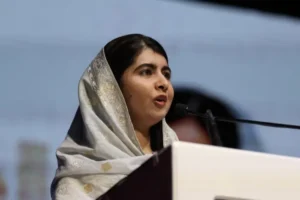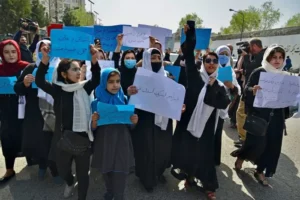As Afghanistan endures a brutal regime under the Taliban, the global spotlight has turned towards the issue of what is being termed as a ‘gender apartheid’. Nobel Peace Prize laureate Malala Yousafzai has consistently advocated for recognizing and addressing the grave injustice faced by women and girls due to systemic discrimination. Her recent calls for international legal action highlight the urgent need to confront the severe human rights violations faced by Afghan women. This article explores Malala’s advocacy, the implications of recent international discussions, and the stark reality of gender apartheid in Afghanistan
What is Gender Apartheid?
Gender apartheid represents an extreme form of gender-based segregation and oppression. It involves the deliberate exclusion of one gender from public life and opportunities, maintaining systemic domination and control. These policies can include prohibitions on girls attending school, severe limitations on women’s employment, and restrictions on their freedom of movement.
Despite the broad international recognition of apartheid as a crime against humanity, gender-based apartheid remains unrecognized as a specific crime under international law. This gap in the legal framework leaves women and girls without a clear path to seek justice or hold the perpetrators accountable for their severe human rights abuses. The concept of gender apartheid, therefore, underscores the need for legal reform to address the extreme injustices faced by women and girls around the world

Malala Champions for Legal Reforms
Malala Yousafzai is known for her relentless advocacy for girls’ education and gender equality, and has been quite vocal about the need to address gender apartheid, specifically in Afghanistan. In a recent statement, Malala has highlighted the urgent need for international recognition and legal codification of gender apartheid as a crime against humanity. Her advocacy focuses on drawing global attention to the plight of Afghan women and pressing world leaders to take decisive action.
Malala’s call to action is rooted in her broader mission to promote human rights and justice. She emphasises that the international community must not only recognize the atrocities being committed but also develop legal mechanisms to hold perpetrators accountable. By framing the issue within the context of gender apartheid, Malala aims to galvanise international support and create a robust framework for addressing the abuses faced by women and girls, everywhere in the world.
The IPI Conference and Its Implications
On March 8th, the International Peace Institute (IPI), in collaboration with the Atlantic Council, held a panel discussion to mark International Women’s Day. The conference served as a significant platform for discussing gender apartheid in Afghanistan. The event featured a range of speakers, including international law experts, human rights activists, and Afghan women directly affected by the Taliban’s policies.
The conference served as a significant platform for examining the dire situation of gender apartheid in Afghanistan. Panelists shared insights on the systematic oppression faced by Afghan women and girls, detailing the Taliban’s extensive and repressive policies. The discussion highlighted the urgent need for international legal recognition of gender apartheid as a crime against humanity.
Key moments of the event included powerful testimonies from Afghan women and girls, providing firsthand accounts of the severe restrictions imposed on their lives. Legal and policy experts contributed their perspectives on developing tools for accountability and urged the international community to formally recognize these crimes. The conference underscored the critical need for a robust international legal framework to address gender apartheid and reinforced the urgency of Malala Yousafzai’s advocacy efforts.
Afghanistan’s History with Gender

Afghanistan’s history with gender equality has been marked by periods of both progress and regression. In the late 20th century, especially during the 1970s and 1980s, Afghan women experienced significant advancements in their rights and freedoms. During this time, women actively participated in public life, with increasing access to education and employment opportunities.
However, this progress was abruptly reversed with the rise of the Taliban in the 1990s. The Taliban’s strict interpretation of Sharia law led to severe restrictions on women’s rights. Women were barred from working, girls were prohibited from attending school, and strict dress codes were enforced.
The situation improved somewhat following the fall of the Taliban in 2001, with increased opportunities for education and employment for women. Yet, the resurgence of the Taliban in August 2021 has led to a dramatic rollback of these gains. The current regime has reinstated many of the repressive policies of the 1990s, severely curtailing women’s rights and freedoms once again.
Call to Action
The escalating crisis in Afghanistan necessitates a concerted and unified global response. Malala Yousafzai’s compelling advocacy for the recognition of gender apartheid as a crime against humanity marks a crucial step toward achieving justice for girls. Her efforts underscore the importance of international recognition and legal action against the systemic violations of women’s rights under Taliban rule.
As discussions on the new Crimes Against Humanity Treaty advance, it is imperative that world leaders and international organizations back the inclusion of gender apartheid in this legal framework. Such inclusion would formalize the recognition of these egregious abuses and pave the way for holding perpetrators accountable.
The international community must act with urgency and resolve to address the profound human rights violations unfolding in Afghanistan. Supporting the codification of gender apartheid into international law would provide a necessary legal tool for accountability. This would also offer a glimmer of hope for a future where Afghan women and girls can fully reclaim their rights and freedoms. This decisive action is essential for ensuring that the voices of those suffering under Taliban oppression are heard and that meaningful steps are taken toward justice and equality.
Click Malala Fund X for more updates
Click International Peace Institute (IPI) X for more updates
Related Stories:
Talks between US Officials and Taliban Leaders: A Glimmer of Hope for Afghanistan?
France Welcomes Afghan Women Escaping Taliban’s Gender Apartheid
Taliban Bans Women from Afghanistan’s Prized National Park, Sparks Outcry
















